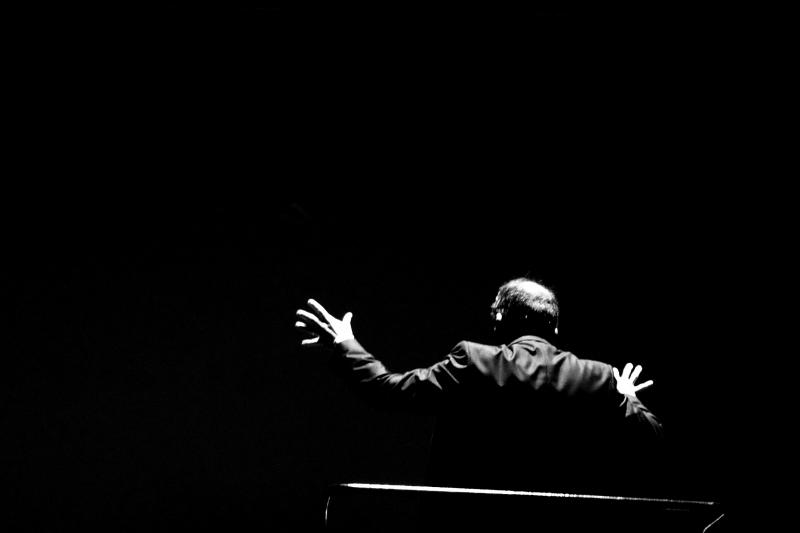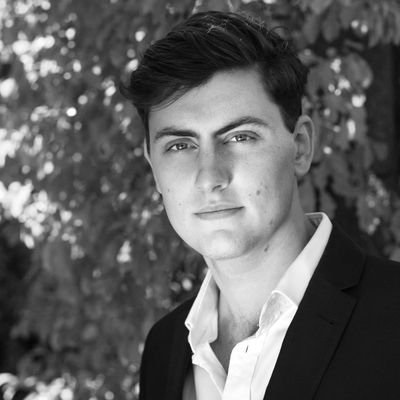LSO, Roth, Barbican - not enough pathos, but a remarkable step-in | reviews, news & interviews
LSO, Roth, Barbican - not enough pathos, but a remarkable step-in
LSO, Roth, Barbican - not enough pathos, but a remarkable step-in
Bass William Thomas, still a student, stepped in and shone in Bartók’s Cantata Profana

Missa in Angustiis. Mass in troubled times. There was a logic in programming Haydn’s D minor Mass on the Armistice Centenary day. The final words of the mass, dona nobis pacem, would be the right ones to end this day of reflection.
Cantata Profana tells an unsettling folk tale about a father and nine sons. The sons are transformed magically – and irreversibly, it transpires – into stags. In its more heated moments, there are evocations of the cruelty of nature with savage exchanges between chorus and the brass section. Even though the story stays bleak, Bartók uses different folk scales to mark a clear transformation in the music from darkness to light, from cruel fate and an implacable vision of nature to final acceptance. It is a complex score, with all kinds of orchestral detail, and yet there is pathos and empathy in those sinuous and fiendish lines of choral counterpoint. Conductor François-Xavier Roth’s tempi were on the hurried side, and this was a performance that just needed more pathos and more space to breathe.
The two male vocal soloists face very different demands in this score. The tenor part has a problematic, shouty, angry, high-lying section, forte or fortissimo throughout, in which the character of the largest stag/eldest son warns the father that he will be at risk of being overpowered and gored by the nine stags/his sons. Tenor Julien Behr gave a valiant account of it, but it sounded strained, as this part often does.
 The 23-year old English bass William Thomas (pictured right by Tom Gimson), on the other hand, who is still a student on the opera programme at Guildhall, made an absolutely remarkable contribution. He had stepped in at just three days’ notice and learnt the part. With his stage presence, vocal colour and emotional honesty, he brought the sympathetic character of the father to life, particularly in the closing section. Thomas has already won the Kathleen Ferrier competition and is clearly a singer who is well on his way to some very great things.
The 23-year old English bass William Thomas (pictured right by Tom Gimson), on the other hand, who is still a student on the opera programme at Guildhall, made an absolutely remarkable contribution. He had stepped in at just three days’ notice and learnt the part. With his stage presence, vocal colour and emotional honesty, he brought the sympathetic character of the father to life, particularly in the closing section. Thomas has already won the Kathleen Ferrier competition and is clearly a singer who is well on his way to some very great things.
It was the singing of another soloist, Camilla Tilling which, for me at least, provided the highlight of Haydn’s ‘Nelson’ Mass from 1798. Her ability to bring grace and shape to the vocal line was a constant delight. Elsewhere the use of a large chorus pitted against an orchestra playing in period style was an unequal battle, and I found myself wondering what a smaller body of singers would have sounded like. Right from the outset, the way these massed singers landed on the plosive "K" of Kyrie was simply too violent and overheavy. The "Credo" section was too leaden-footed, and the choral phrases at the end of the "Et Incarnatus" had an overpoweringly heavy swell in them. Roth’s tempi were again somewhat hurried, and some of the detail and the humanity were skated past.
The studied stillness of the concert’s opener, Ligeti’s Lontano from 1967 was marred by some ferocious all-too-near coughing from the audience. Ligeti now has his historical place as a source of fascination for Stanley Kubrick in the film 2001. He can also be situated as a precursor to the ambient sound movement, and in this performance, Lontano was in danger of sounding like a get-our-heads-down-and-concentrate study of orchestral timbre, a historical curiosity rather than a work of real intrinsic value.
This was a demanding programme, The London Symphony Orchestra’s achievement of going from micro-managed Ligeti to deeply complex Bartók, and then straight into lean, vibrato-less Haydn cannot be underestimated. And furthermore, there are individual musicians in this orchestra who will invariably produce their moments of jaw-dropping magic, such as bone-shakingly violent harp glissandi from Bryn Lewis in the Bartók. The LSO is as adept as any orchestra in the world when faced with an adventure in era-hopping like this, But, even for them, this was mission not-quite-possible.
Add comment
The future of Arts Journalism
You can stop theartsdesk.com closing!
We urgently need financing to survive. Our fundraising drive has thus far raised £49,000 but we need to reach £100,000 or we will be forced to close. Please contribute here: https://gofund.me/c3f6033d
And if you can forward this information to anyone who might assist, we’d be grateful.

Subscribe to theartsdesk.com
Thank you for continuing to read our work on theartsdesk.com. For unlimited access to every article in its entirety, including our archive of more than 15,000 pieces, we're asking for £5 per month or £40 per year. We feel it's a very good deal, and hope you do too.
To take a subscription now simply click here.
And if you're looking for that extra gift for a friend or family member, why not treat them to a theartsdesk.com gift subscription?
more Classical music
 Bizet in 150th anniversary year: rich and rare French offerings from Palazzetto Bru Zane
Specialists in French romantic music unveil a treasure trove both live and on disc
Bizet in 150th anniversary year: rich and rare French offerings from Palazzetto Bru Zane
Specialists in French romantic music unveil a treasure trove both live and on disc
 Scottish Chamber Orchestra, Ibragimova, Queen’s Hall, Edinburgh review - rarities, novelties and drumrolls
A pity the SCO didn't pick a better showcase for a shining guest artist
Scottish Chamber Orchestra, Ibragimova, Queen’s Hall, Edinburgh review - rarities, novelties and drumrolls
A pity the SCO didn't pick a better showcase for a shining guest artist
 Kilsby, Parkes, Sinfonia of London, Wilson, Barbican review - string things zing and sing in expert hands
British masterpieces for strings plus other-worldly tenor and horn - and a muscular rarity
Kilsby, Parkes, Sinfonia of London, Wilson, Barbican review - string things zing and sing in expert hands
British masterpieces for strings plus other-worldly tenor and horn - and a muscular rarity
 From Historical to Hip-Hop, Classically Black Music Festival, Kings Place review - a cluster of impressive stars for the future
From quasi-Mozartian elegance to the gritty humour of a kitchen inspection
From Historical to Hip-Hop, Classically Black Music Festival, Kings Place review - a cluster of impressive stars for the future
From quasi-Mozartian elegance to the gritty humour of a kitchen inspection
 Shibe, LSO, Adès, Barbican review - gaudy and glorious new music alongside serene Sibelius
Adès’s passion makes persuasive case for the music he loves, both new and old
Shibe, LSO, Adès, Barbican review - gaudy and glorious new music alongside serene Sibelius
Adès’s passion makes persuasive case for the music he loves, both new and old
 Anja Mittermüller, Richard Fu, Wigmore Hall review - a glorious hall debut
The Austrian mezzo shines - at the age of 22
Anja Mittermüller, Richard Fu, Wigmore Hall review - a glorious hall debut
The Austrian mezzo shines - at the age of 22
 First Person: clarinettist Oliver Pashley on the new horizons of The Hermes Experiment's latest album
Compositions by members of this unusual quartet feature for the first time
First Person: clarinettist Oliver Pashley on the new horizons of The Hermes Experiment's latest album
Compositions by members of this unusual quartet feature for the first time
 Gesualdo Passione, Les Arts Florissants, Amala Dior Company, Barbican review - inspired collaboration excavates the music's humanity
At times it was like watching an anarchic religious procession
Gesualdo Passione, Les Arts Florissants, Amala Dior Company, Barbican review - inspired collaboration excavates the music's humanity
At times it was like watching an anarchic religious procession
 Classical CDs: Camels, concrete and cabaret
An influential American composer's 90th birthday box, plus British piano concertos and a father-and-son duo
Classical CDs: Camels, concrete and cabaret
An influential American composer's 90th birthday box, plus British piano concertos and a father-and-son duo
 Cockerham, Manchester Camerata, Sheen, Martin Harris Centre, Manchester review - re-enacting the dawn of modernism
Two UK premieres added to three miniatures from a seminal event of January 1914
Cockerham, Manchester Camerata, Sheen, Martin Harris Centre, Manchester review - re-enacting the dawn of modernism
Two UK premieres added to three miniatures from a seminal event of January 1914
 Kempf, Brno Philharmonic, Davies, Bridgewater Hall, Manchester review - European tradition meets American jazz
Bouncing Czechs enjoy their Gershwin and Brubeck alongside Janáček and Dvořák
Kempf, Brno Philharmonic, Davies, Bridgewater Hall, Manchester review - European tradition meets American jazz
Bouncing Czechs enjoy their Gershwin and Brubeck alongside Janáček and Dvořák
 Solomon, OAE, Butt, QEH review - daft Biblical whitewashing with great choruses
Even a top soprano and mezzo can’t make this Handel paean wholly convincing
Solomon, OAE, Butt, QEH review - daft Biblical whitewashing with great choruses
Even a top soprano and mezzo can’t make this Handel paean wholly convincing

Comments
Yet another review where the